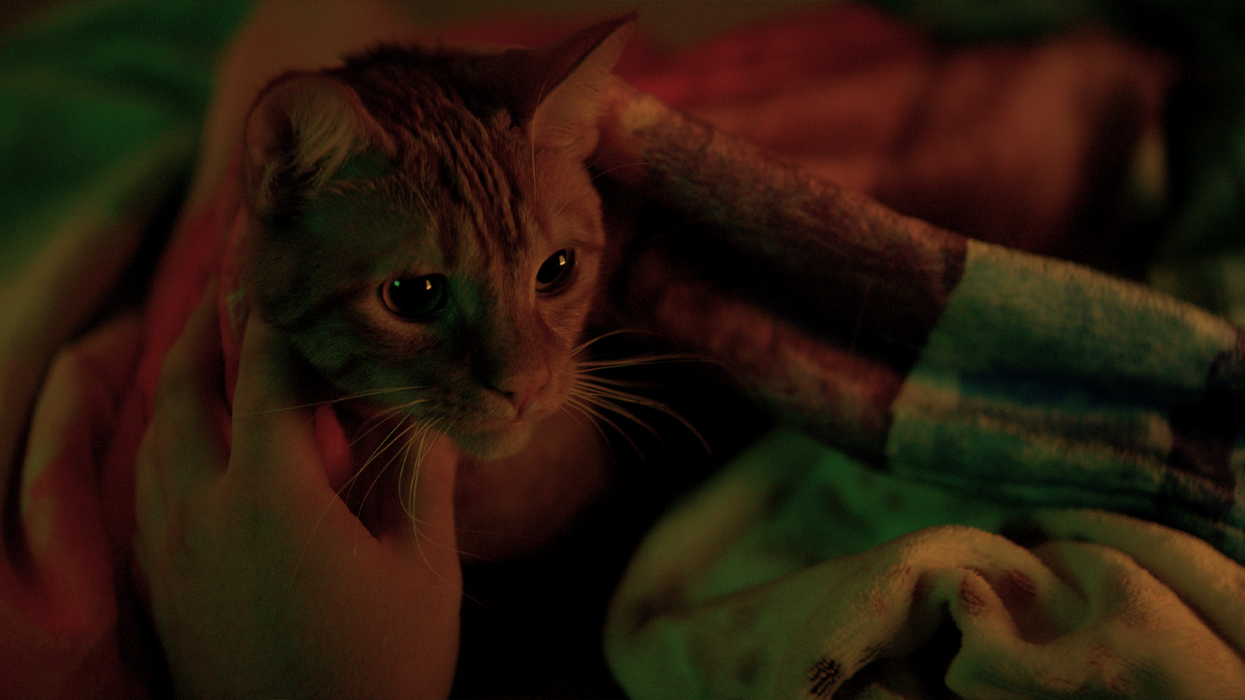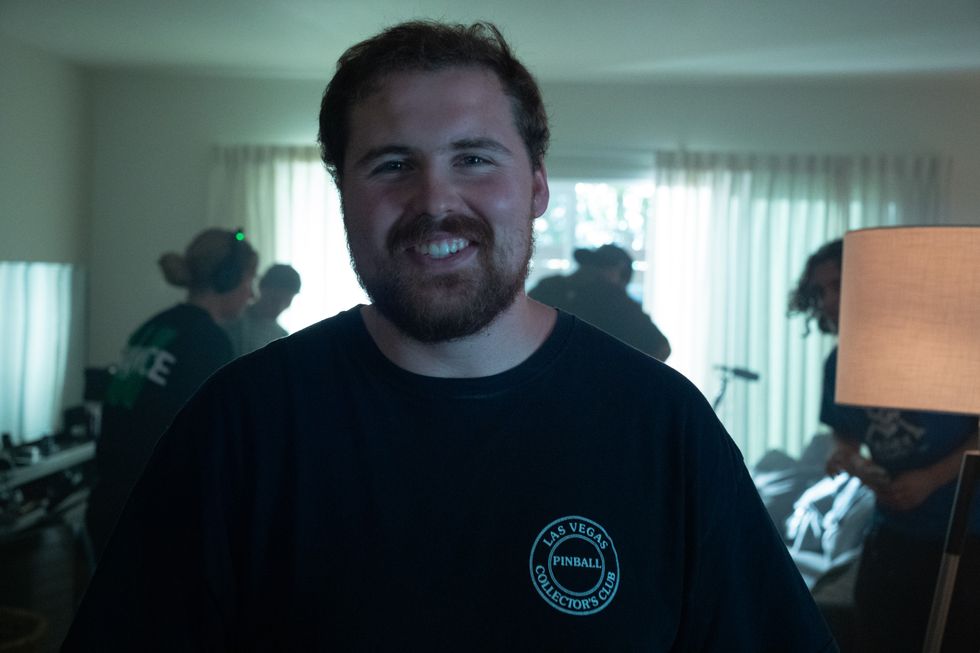This Is How an Emerging Filmmaker Balances Filming, Work, and Grief
Filmmaker Alec Cohen-Schisler breaks down his proccess behind his latest short film, Petunia.

'Petunia'
This post was written by Alec Cohen-Schisler.
The blank page is the ultimate enemy of the creative. For anyone who’s done a “Thesis Film,” this starting-point analysis-paralysis feels so much more severe. You have to write something that feels emblematic of you. Your styles, sensibilities, genre, mood, tone. But who are you?
The singular most important moment of my filmmaking journey was a seemingly innocuous meeting with my NYU thesis film professor, Alrick Brown. I had a script that was a jumbled mess of ideas, trying to tell a story that I lacked perspective and research on. Professor Brown hounded me, for every idea I suggested he would rebuttal with: “Are you telling the truth?” I slowly realized the more I embellished, the more plastic my film felt.
When I thought I’d finally hit a breaking point, COVID-19 hit as well. I graduated as quickly as possible, fled to the opposite coast, and forgot about my hesis film entirely... until I was reminded that I had two months to complete it.Finding Accountability

'Petunia'
Credit: Petunia Short Film
One of the major advantages of film school is that professors actively encourage you and give you deadlines to write, shoot, and/or edit. When you graduate, that all goes away. I got a job right out of school that I simply could not refuse: I was a content creator making educational content for filmmakers at Aputure Lighting. The hours were long, and while it was fun to flex my creative muscles at work, I often came home drained.
For this reason and millions more, I put off the writing process for nearly two years. With less than a month to get a thesis script greenlit, I stumbled upon a catalog for my local Community College. They were offering a comprehensive 4-week Screenwriting 101 class. I had my reservations about it, but signed up blindly, hoping my teacher would help me stay accountable and finish my short script.
Writing What You Know

'Petunia'
Credit: Petunia Short Film
After all those years of trying to find a script that was emblematic of me, I first had to dig deep. About a year before writing this script, our newly adopted kitten, the titular Petunia, had to tragically be euthanized. Several of his organs weren’t fully formed from birth, we were blindsided, he had been acting completely normal just days before.
My fianceé and I struggled for months; grappling with feelings of failure, grief, and depression. We were cagey about the situation, not wanting others to think we did a “bad job” with the first pet we ever adopted. Once we felt that we had fully grasped and recovered from the trauma of Petunia’s passing, I asked for my fianceé's blessing to tell Petunia’s story, and she granted it.
The writing process was grueling but fast. The story was all there, the beats were simple, and it poured out of me once the floodgates opened. It was tender to revisit, revise, and edit. This is where Screenwriting 101 was instrumental; I was interacting with a dozen strangers whom I may never see again. I could be completely vulnerable and raw with my story. In less than a month the script was locked, and it was time to figure out how to make it.Work

Behind-the-scenes of 'Petunia'
Credit: Lydia Hall
I would highly encourage young filmmakers to consider working for film equipment companies if given the opportunity. I met many of my creative collaborators through Aputure (including the majority of my producers and crew on Petunia) and was granted many favors through work. Shortly after locking the script, I was shipped off to the NAB Tradeshow (National Association of Broadcasters) in Las Vegas to help create content for Aputure.
Tradeshows like NAB, Cinegear, IBC, etc. are incredible opportunities for filmmakers of all levels to interact directly with the leading film equipment and software brands. Not only can you demo the cutting-edge gear that will soon be on every film set, but you can also build relationships with the companies and people behind the brand, who are all amazing.
Through networking and casually pitching the project to my peers, I was able to secure free rentals from Aputure, Deity Microphones, Atlas Lens Co. as well as heavy discounts from Old Fast Glass and other rental houses. Many of these and other companies want you to grow with their equipment and are happy to offer short-term loaners, just make sure to be kind and respectful, communicate your vision clearly, and keep in touch with them. It’s easy to feel like you’re on an island sometimes, but everyone in the film equipment industry understands the struggle of independent filmmaking and wants to support you.
One night over drinks in Vegas, one of the Aputure ambassadors Brady Bessette, and I were discussing the project. Though at first he seemed hesitant, I was somehow able to talk him into being the Cinematographer for Petunia. It was a surreal moment for me as Brady was one of my heroes and taught me so much about cinematography, and now I would get to work hand-in-hand with him. If you’re working on a passion project, you have to pitch it to everybody who will listen, and you never know who will be willing to help out.
Pre-Production

Behind-the-scenes of 'Petunia'
Credit: Dylan Marzke
By all accounts, pre-production was relatively smooth, yet casting felt like the largest re-occurring obstacle. With about three weeks left before production, I felt as though I had built a dream team of actors, mainly through DMing actors I admired or friendships formulating into perfect casting. Shortly after though, my two leads both had to drop due to other projects getting extended.
One was an unexpectedly easy fix: I had gotten in touch with stand-up comedian Alycia Cooper after a killer set at the Comedy Store and amazingly she said yes. Backstage.com and Actors Access are great places to cast amazing actors but stay open to reaching out to anyone you think would have the right instincts for your project. Follow your favorite independent actors on social media and politely reach out. If the script is strong, you’d be surprised who you can get.
In the case of the protagonist, the self-titled Alec, I auditioned at least a dozen incredible actors and combed through hundreds of self-tapes. No one quite nailed it. From the advice of two of my filmmaking mentors, Jim Cummings and Joel Portrykus; “the only person that can play you is you.” That’s exactly what I decided to do.
Production

'Petunia'
Credit: Petunia Short Film
I should probably mention that I’m not an actor. Acting and directing is by far the hardest thing I’ve ever done, especially for a self-funded passion project. The advantage that my mentors highlighted though, is that the film runs through you. You’re the one to set the tone, through your rehearsals you can help guide the other actors to the desired tone you’re looking to achieve without doing line readings.
The most important takeaway from my experience was to overcommunicate in pre-production and to trust fully in production. We didn’t have time to watch playback, and I had to live in the moment while performing instead of using half my brain to direct. This required an unprecedented amount of trust in Brady, my producers, and everyone else on set, to help facilitate the vision. Watching dailies was brutal, there was so much that went unseen, and I had to learn to live with my own ticks and idiosyncrasies.
The most important piece of this process has been to check my self-consciousness at the door and allow myself to be the character, even though the character is me. While it’s still so difficult to re-live this traumatic slice of my life, I feel catharsis in being able to tell Petunia’s story to the world.

Filmmaker Alec Cohen-Schisler
Credit: Michael Schisler
Filmmaking is the one facet of my life I’ve found that I can push everything aside and get the job done by any means necessary.
I think this is true of any successful filmmaker, you find a higher gear that fuels everything you do because you care so much about delivering the best possible final product. I always wondered why I struggled so much in High School. I never achieved a flow state and was constantly procrastinating.
Once I started film school, I realized I was so much more passionate and excited about filmmaking, that everything felt easy and effortless. Since graduating though, it’s been much more difficult than expected to simply pick up a camera and click record. If you’re reading this right now, and feel the same way, just know that nothing is stopping you except yourself.
Go write, go shoot, go edit. Repeat.
This post was written by Alec Cohen-Schisler.











